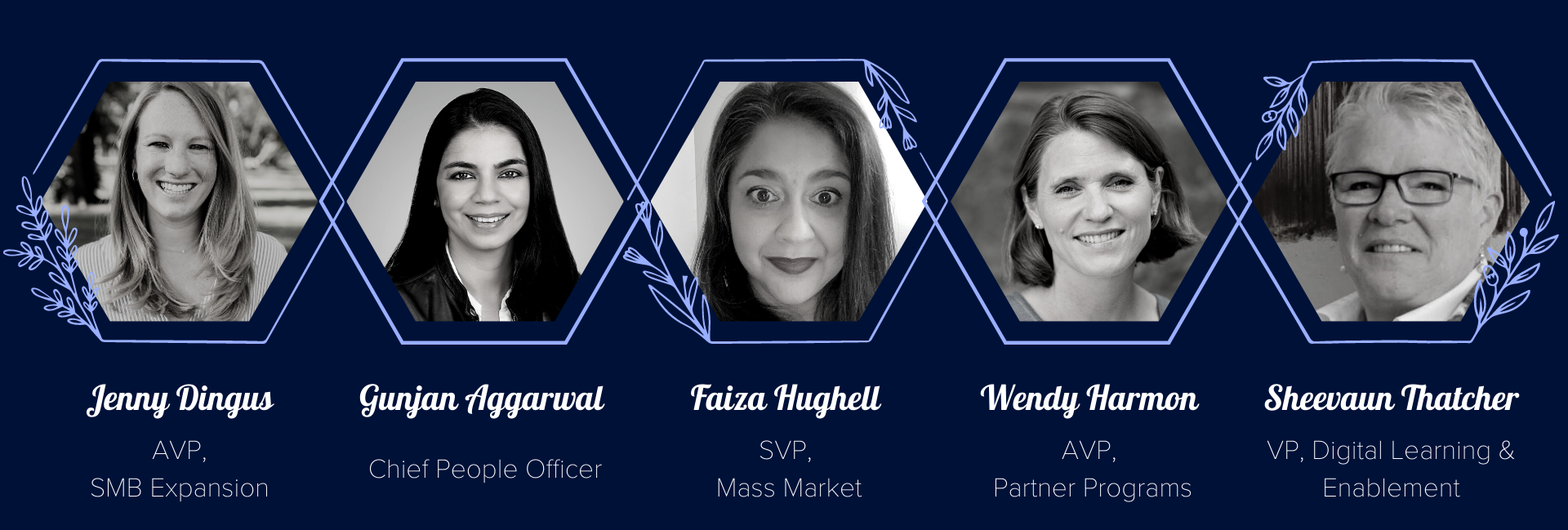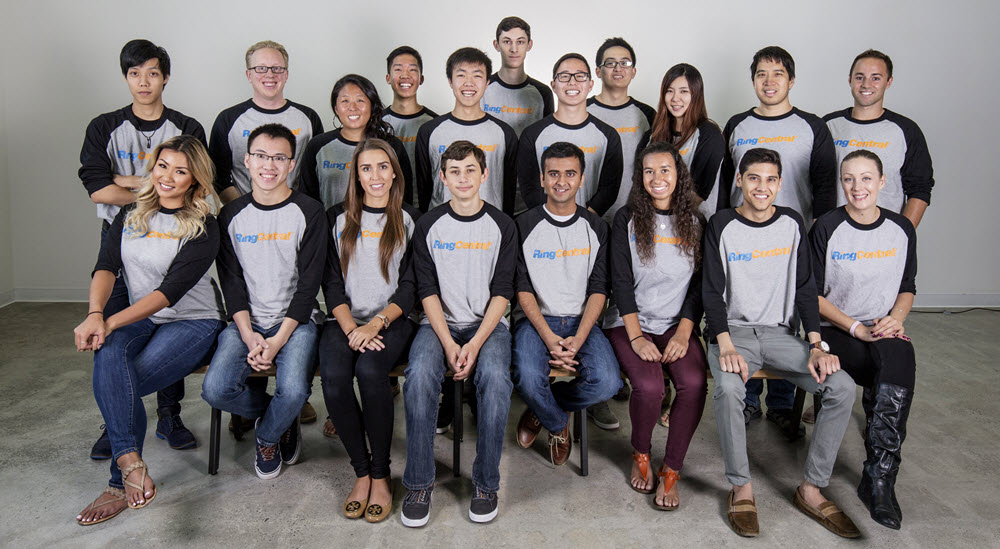RingCentral’s SaaSY Women’s Leadership Panel helps us honor Women’s History Month with critical insights into personal and professional success
Women’s History Month is about lifting one another up. That’s exactly the spirit behind SaaSy Women – an Employee Resource Group that provides a space for women in the SaaS (Software As A Service) industry to support, inspire and lift one another up.
RingCentral recently hosted a SaaSY Women’s Leadership Panel, which turned into a fascinating discussion around how women in technology define leadership now, and how the next generation of female leaders can take personal and professional success to an even higher level.
The panel included:

Making the most of your time. So you can make the most of every moment.
The line between “busy” and “productive” often gets blurry. Claiming the time and space you need to be your best can help you give your team the freedom they need to be their best.
HARMON: “When I think about productivity, it’s all about discipline, and having the courage and the strength to identify activities that are most important. Then, I give my total focus to those. It starts by looking at my core values, the values that drive me as an individual. I make sure that what I’m working on is the most important for the business, most important for my team, and ultimately, most important for myself.”
HUGHELL: “Being “busy” isn’t a good sign of health, or a good sign of productivity. Being efficient is a driver of productivity. I think as women in leadership…we need to remember it’s okay to delegate, empower people around you, beneath you and beside you, to lead with you, so you can remain productive. If you absorb it all yourself, what will happen is you’ll do a little bit of everything and not enough of anything to make an impact.”
DINGUS: “If you have trust in your team, magic can happen. When you spread the opportunity to work the problem across your team, that’s where the true impact of collaboration occurs and the team’s output exceeds your expectations.”
THATCHER: “I have at least one hour on my calendar every day called “Focus Time,” and it is untouchable. Nobody’s allowed to (schedule) any time over it; I will deny any meetings that come up, because that is the time I get to sit and think. And of course…trusting the people on your team. I know that my leaders are running their franchises like franchises, and I get involved to get stuff out of their way. Other than that, I trust that they are doing the right things for themselves in their business. I’m there to help them when they need it. And otherwise, I just get out of their way. And they go.”
AGGARWAL: “I try to get some time to learn – reading the latest research in areas that are of interest to me, or by talking to people with completely different backgrounds, completely different professions. That really charges me and gives me that feeling of balance and accomplishment and doing something more than just you know, getting done with the list.”
If you’re not learning to fail, you’re failing to learn.
People in technology often talk about “not being afraid to fail.” According to the group, that’s not always as easy as it sounds —but there is always something to learn.
THATCHER: “How do you know how to win if you don’t know how to lose? As long as you take something from it, you’re honest about it and own it. You’ve got to own it, take from it, and you go forward. I encourage everybody on my team to take risks. And to figure out—did it work? Did it not work? Either way, they’ve learned something.”
HUGHELL: “If you don’t fail, you don’t learn. And it’s really important to learn. So as badly as I’m addicted to winning, I’m just as addicted to learning and growing. I learn through other people’s failures as well. I ask a ton of questions: “What did that feel like? How did it work? What will you never do again? What will you do next time?”
It’s really important to be comfortable enough to ask those questions of yourself and of others around you as well.”
HARMON: “Stepping back and being kinder to myself is the key to managing my failures. If I can learn to be kinder to myself, I can actually look at a situation that I feel like I didn’t succeed in, truly be introspective, and try to do it better next time.”
DINGUS: “I gave a presentation, and it…didn’t go well. And the people on the call knew it didn’t go well. When it ended, a mentor of mine gave me a ring and said, “I know you’re upset. But five years from now you’re going to be interviewing for a high level position and they’re going to ask you, ‘What’s the hardest thing you’ve had to overcome?’ And this is your story.” Now for me, it wasn’t about getting that better job five years from now. The reality is, this was an opportunity to learn and grow. And I can tell you, that growth actually happened. (My team) started to learn from the challenges we faced and we became more efficient— we started moving as one unit.”
Be a team player. But be sure to get the win.
Women often find it easier to advocate for their team than themselves. The panel offered insights on effective strategies for celebrating team wins…while gently-but-firmly reminding the world who enabled them.
HUGHELL: “As leaders, you advocate for everyone around you, but don’t forget to advocate for yourselves, too. It’s really important. Advocating for yourself isn’t necessarily getting on a soapbox and asking the world to look at you and what you’ve accomplished. It’s having the courage to point out the things that empower or impede your forward motion. I think you advocate for yourself by saying, “I’d like to share my personal aspirations with you.” You’re not saying “I demand this, I want this, I need this,” you’re sharing and by sharing, that share will get reciprocated. You can inspire a conversation about growth and development.”
THATCHER: “Being quiet and thinking, “Everybody’s going to recognize what I do” is not the case. You need to make sure that when you do something that has an impact, number one, you document it. And number two, you’re not afraid to be proud of the work that you do. Not being afraid to let people know that you’ve had an impact is critical to your career.”
AGGARWAL: “There was a position I was really keen to take on, where I was told I was not going to be selected. So I decided to have a conversation with my manager. And it was, “Okay, help me understand, I want to really nail it down and understand the things that made you decide against me, and the things that worked in favor of the other person.” It turned out to be a phenomenal meeting, because I was open about what I wanted without putting anyone on the defensive. I think those questions started the discussion: he eventually spoke on my behalf with his manager…and I finally got the job.”
DINGUS: “A lot of times we forget to celebrate the wins of the team. But every time we take a minute to celebrate the incredible work that the team is doing, it’s an opportunity to showcase the great work that’s happening within my organization. By nature, that lifts me up. So I absolutely agree, you’ve got to put yourself first. But ultimately, the business has to understand the value of the team behind you – what they bring to the table every day.”
What makes a leader great?
At RingCentral, there’s nothing more critical than the ability to bring your whole self to work.
THATCHER: “I’ve been out for 40 years. About 10 years ago, I decided—that’s it. I’m done. And I just started talking about my wife and I started talking about my life. And I started talking about where I came from and just being there because frankly, being gay has nothing to do with how I am as a leader. Do you do your job well? Do you support people? Do you apologize when you make a mistake and own it? Do you forgive folks? And do you really just show up with exactly who you are? Every single time?
I no longer give advice to people to separate their home from their work. You are who you are, so be there, show up, do it. And this is the only company I’ve ever been at that truly fosters this and really walks the talk to be who you are because it is celebrated here. It’s not something to be ashamed of. So come in, be yourself. Be there and really, really show up.”
HARMON: “My authentic self can be a huge differentiator between me and a table full of men with identical attitudes or background or experience. And I’ve learned—If I’m going to help my team be authentic, I need to model that every day. I need to be genuine, real and give everyone on my team the understanding and space they need to bring the best of who they are, the way I strive to. It’s an awesome responsibility. But that’s my goal.”
HUGHELL: “Number one is transparency. Transparency establishes trust and trust is so critical in any relationship, business or personal. Second is empathy. You cannot judge a person or an outcome with a blanket approach — life is too situational for that. Number three would be empowerment. I’ve had the privilege to work with a lot of leaders who have taught me to empower myself. I don’t have to ask for permission every five minutes. I don’t have to second-guess or socialize things. I can make decisions, execute and move forward.”
AGGARWAL: “The big one for me is humility. I feel that it is so important to acknowledge your team, the people, your managers, people around you who make you successful. Then the second one is decisiveness. I want my leaders and myself as a leader to be decisive. The third is bravery. When you decide something and make a mistake, just admit it and say I made a mistake. But bravery takes on a different aspect for women and minorities, because that requires questioning the limits imposed on you growing up. I was told — “Get married, have kids, take care of your family.” I struggled with that label every day, as many other women do. To overcome that, you have to be brave enough to take charge and not fall into the trap of being a victim, of feeling like we can’t do anything about circumstances that happen to us. It is incredibly hard but I push myself to take charge, do what I can do and make a difference.”
When to set limits. When to reach out.
Setting your boundaries can unlock your potential. So can knowing when to ask for help.
DINGUS: “I’ll share some advice Faiza shared with me: Focus on the things that pull you forward, not the things that pull you down. Going back to the idea of bringing your authentic self to work—you have to make sure you’re ok, otherwise, it makes it harder for the people around you to be ok. Ultimately, it’s about setting boundaries, and making sure that you can confidently communicate those boundaries with the people that depend on you. Boundaries are different for everybody, so it’s important to have the self awareness of what you need to be the best version of yourself and use that as a framework to define your own guardrails.”
HUGHELL: “It’s advice I give to all new leaders: Don’t say yes to everything, you cannot be everywhere. And it’s important to note that you shouldn’t be everywhere. Boundaries are something you define, and they should center on those vital few things that help move the needle towards your team’s goals and your own personal goals and aspirations.”
THATCHER: “One of the best things you can do for yourself, besides setting boundaries, is put your hand up and reach for someone to help you. There are amazing people in this company, and in your network who can help you get there. They’ve been down the road. They know the pitfalls. And it’s up to you as new leaders to also reach out to others and help them up their career jungle gym, (it’s not a ladder). Of all the places I’ve ever been, (RingCentral) is the place where everybody wants to do the right thing. Everybody wants to help—take advantage of that.”
Women’s History Month celebrates breaking boundaries and the courage to reach for something higher. There’s no single recipe on how to do that for yourself. But the lessons these women share every day provide inspiration that can help us all work smarter, advocate effectively, live intentionally, and be stronger, together.
Originally published Mar 19, 2021, updated Dec 30, 2022





